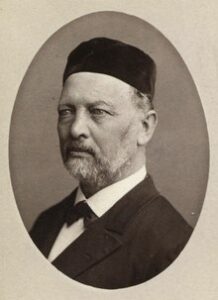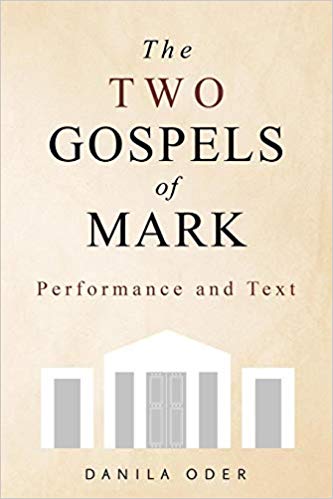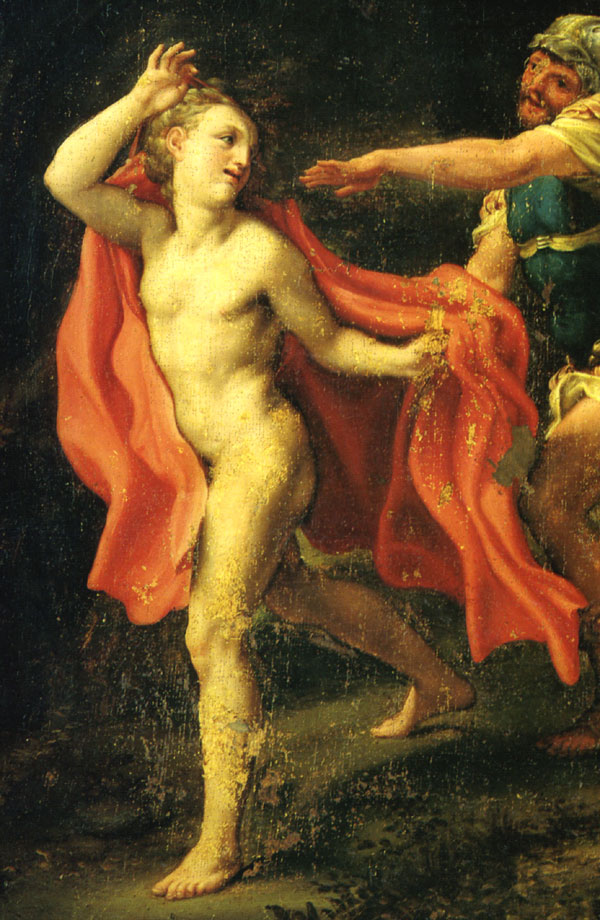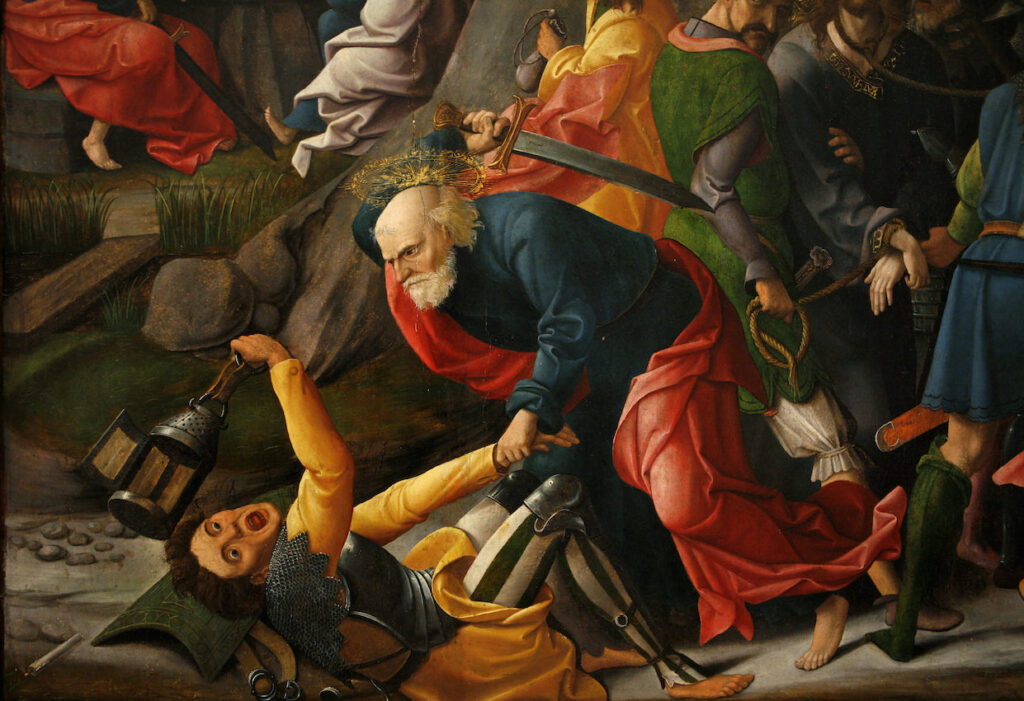The Gospel of Mark is often ambiguous and disconcerting, but whether the intention of its author was “play” I doubt. Recently I was pulled up while reading an article about an ancient heresy that asserted Jesus was not real flesh but spirit in the guise of flesh, and that the one who was crucified was Simon of Cyrene, the one said in the synoptic gospels to have carried the cross of Jesus to Golgotha. — But none of that startled me because it is all well known. Rather, what pulled me up was the author’s reference to the Gospel of Mark 15:21f as an
overall playful discourse of the multiple and mistaken identities on stage during the Passion. (Hoklotubbe p. 57)
Ambiguity in the Gospel of Mark was not a new insight but what was new-ish for me was reading this notion in the context of a discussion about Simon of Cyrene carrying the cross of Jesus.
Before explaining why, let’s get orientated. Here is the passage in the Gospel of Mark from Young’s Literal Translation:
20 and when they [had] mocked him, they took the purple from off him, and clothed him in his own garments, and they led him forth, that they may crucify him.
21 And they impress a certain one passing by — Simon, a Cyrenian, coming from the field . . . . — that he may bear his cross,
22 and they bring him to the place Golgotha, which is, being interpreted, `Place of a skull;’
23 and they were giving him to drink wine mingled with myrrh, and he did not receive.
24 And having crucified him . . . .
Read the above carefully and ask yourself: whom do these verses say is being crucified?
Let’s backtrack a little. The quote I cited spoke of multiple mistaken identities during the Passion. Indeed, many of us know of Pilate asking the mob if he should release to them Barabbas instead of Jesus — the name Barabbas meaning “son of the father”. Jesus, of course, is known as the Son of the Father (God) among the mainstream faithful. The mob chose the wrong “son of the father”.
During the first trial of Jesus before the high priest he was asked if he were the Messiah. Mark 14:61-64
61 Again the chief priest was questioning him, and saith to him, `Art thou the Christ — the Son of the Blessed?’
62 and Jesus said, `I am; and ye shall see the Son of Man sitting on the right hand of the power, and coming with the clouds, of the heaven.’
63 And the chief priest, having rent his garments, saith, `What need have we yet of witnesses?
64 Ye heard the evil speaking, what appeareth to you?’ and they all condemned him to be worthy of death
Jesus is asked if he is the Messiah but his audience understands his answer to be a lie.
Then at the opening of the trial before Pilate, Jesus was asked if he was the king of the Jews but Jesus curiousily replied, “You say it”. Then in the subsequent mocking of Jesus the soldiers pretend that he is the king — all highly ironical for the faithful reader of the gospel.
So yes, there is ambiguity aplenty over the identity of Jesus in Mark’s Passion narrative.
Surely, though, there can be no doubt that the gospel intended the readers to understand it was Jesus, and not Simon, who was crucified. Of that I can have no doubt at all since it was the clear intent of the gospel narrative from the opening verse of the opening chapter.
But we know that earlier in the narrative Jesus had spoken of the necessity for his disciples to take up their crosses and follow him. Recall the time Jesus elicited multiple confusions over his identity before instructing Peter (originally named Simon) to take up his cross and follow Jesus with it. Mark 8…
27 And Jesus went out with His disciples into the towns of Caesarea Philippi; and on the way He asked His disciples, saying unto them, “Who do men say that I am?”
28 And they answered, “John the Baptist; but some say Elijah, and others, one of the prophets.”
29 And He said unto them, “But whom say ye that I am?” And Peter answered and said unto Him, “Thou art the Christ.”
30 And He charged them that they should tell no man of Him.
31 And He began to teach them that the Son of Man must suffer many things, and be rejected by the elders and by the chief priests and scribes, and be killed, and after three days rise again.
32 And He spoke that saying openly. And Peter took Him and began to rebuke Him.
33 But when He had turned about and looked on His disciples, He rebuked Peter, saying, “Get thee behind Me, Satan; for thou savorest not the things that are of God, but the things that are of men.”
34 And when He had called the people unto Him with His disciples also, He said unto them, “Whosoever will come after Me, let him deny himself, and take up his cross, and follow Me.
Was the author of the Gospel of Mark being careless or subtle when he left the identity of the one being nailed to the cross open to ambiguity?
20 . . . . and they led him [sc. Jesus] forth, that they may crucify him.
21 And they impress a certain one passing by — Simon, a Cyrenian, coming from the field . . . . — that he may bear his cross,
22 and they bring him to the place Golgotha . . . .
24 And having crucified him . . . .
On the face of it, the immediate literal meaning is that they crucified Simon, but we know, of course, that it was really Jesus who was crucified.
Compare other ambiguities in this gospel:
Was the daughter of Jairus really dead or only in a deep sleep? It’s in Mark chapter 5:
22 Then one of the synagogue leaders, named Jairus, came, and when he saw Jesus, he fell at his feet. 23 He pleaded earnestly with him, “My little daughter is dying. Please come and put your hands on her so that she will be healed and live.” 24 So Jesus went with him. . . .
35 . . . . some people came from the house of Jairus, the synagogue leader. “Your daughter is dead,” they said. “Why bother the teacher anymore?”
36 . . . . Jesus told him, “Don’t be afraid; just believe.” . . . .
38 When they came to the home of the synagogue leader, Jesus saw a commotion, with people crying and wailing loudly. 39 He went in and said to them, “Why all this commotion and wailing? The child is not dead but asleep.” 40 But they laughed at him. . . . .
41 He took her by the hand and said to her, “Talitha koum!” . . . . 42 Immediately the girl stood up and began to walk around . . . .
Is the girl asleep or dead? Or is the author telling us through the ambiguity that there is no substantial difference between sleep and death?
Does the intended reader imbibe a similar message when they read about Simon taking the cross of Jesus … “and they crucified him”? The author could have easily and quite naturally have said, “And they bring Jesus to the place Golgotha….” instead of leaving the reader to do a mental double-flip to assume that he is no longer talking about Simon of Cyrene.
Confession time. I am attracted to the hypothesis of Andreas Bedenbender that the Gospel of Mark in many respects draws the inspiration for its narrative from the Jewish War of 66-70 CE. See The Crucifixion of Jesus as Implicit History of the Jewish War.
Many exegetes have further argued that this gospel draws heavily upon the letters of the apostle Paul. If so, we have good reason to believe that our author is deliberately telling readers that the crucifixion of Jesus has meaning only insofar as it means the crucifixion — the putting to “death” of the flesh — of all his followers.
Hoklotubbe, Chris. “What Is Docetism?” Re-Making the World: Christianity and Categories. Essays in Honor of Karen L. King, January 1, 2019. https://www.academia.edu/55282211/What_is_Docetism.
Like this:
Like Loading...
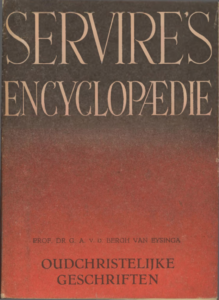 While recently focussed on translating older works I have been overlooking other works I have translated over the years and know that some readers may find of interest. Copyright forbids me from making many of them public but I could work my way through them one by one and see what can be shared. Here is one that I completed last year — though much of it is also available on Hermann Detering’s website in a series of posts.
While recently focussed on translating older works I have been overlooking other works I have translated over the years and know that some readers may find of interest. Copyright forbids me from making many of them public but I could work my way through them one by one and see what can be shared. Here is one that I completed last year — though much of it is also available on Hermann Detering’s website in a series of posts.
